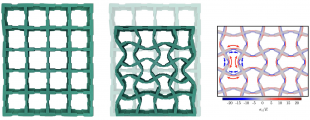This project aims to investigate the capabilities of adaptive structures that change their geometry and mechanical properties to accommodate operational loading and extend their lifespan, thereby supporting sustainable infrastructure and a circular economy.
The core objective of this project is to engineer a self-adapting structure that adjusts to the prescribed loading conditions. This adaptation is achieved by integrating local structures that accommodate stiffness variations along the global structure. The local structures will change their geometry and shape in response to the applied loads, resulting in emergent properties in the main global structure. Analytical modeling of the sub-structures will provide understanding and control for stiffness tailoring, which will translate into desirable mechanical properties in the main structure. The connection between global properties and sub-structure geometry changes aims to be achieved by understanding the relationships between geometric parameters and vibration response. The geometric nonlinearity induced by the local sub-structures may cause amplitude-dependent nonlinear dynamic responses. Thus, understanding the underlying physics in the coupling between local and global structures, along with the vibration response of the global structure, aims to facilitate feedback to passively control the mechanical properties of the structure. Consequently, this dynamic response leads to continuous shape and geometry modifications within the structure, ultimately enhancing its capacity to accommodate specified loading requirements more effectively. The adaptive structures will benefit operability by maximizing structural capacity during service.
This project is supervised by Dr David Garcia Cava (School of Engineering, University of Edinburgh). It will involve regular interaction with collaborators from academia and industry. Interested candidates may contact the supervisor for further information (david.garcia@ed.ac.uk).
Personal website: https://dgarciacava.github.io/
This advert might close once a suitable candidate is found. Please apply as soon as possible to avoid disappointment.
References
[1] Sundararaman, V., O’Donnell, M.P., Chenchiah, I.V., Clancy, G. and Weaver, P.M., 2023. Stiffness tailoring in sinusoidal lattice structures through passive topology morphing using contact connections. Materials & Design, 226, p.111649.
[2] Zhao, B., Thomsen, H.R., Pu, X., Fang, S., Lai, Z., Van Damme, B., Bergamini, A., Chatzi, E. and Colombi, A., 2024. A nonlinear damped metamaterial: Wideband attenuation with nonlinear bandgap and modal dissipation. Mechanical Systems and Signal Processing, 208, p.111079.
Further Information:
The University of Edinburgh is committed to equality of opportunity for all its staff and students, and promotes a culture of inclusivity. Please see details here: https://www.ed.ac.uk/equality-diversity
Closing Date:
Principal Supervisor:
Assistant Supervisor:
Eligibility:
Minimum entry qualification - an Honours degree at 2:1 or above (or International equivalent) in a relevant science or engineering discipline, possibly supported by an MSc Degree.
Applications are particularly welcome from candidates expecting to receive a first-class degree in mechanical engineering, physics, applied mathematics or a closely related subject.
Interests on: Structural mechanics and dynamics, Stochastic modelling and uncertainty quantification.
Further information on English language requirements for EU/Overseas applicants.
Funding:
Applications are welcomed from self-funded students, or students who are applying for scholarships from the University of Edinburgh or elsewhere.
*Competition (EPSRC) funding may be available for an exceptional candidate but please note you must be a UK student or an EU student who has pre-settled/settled status and has lived in the UK for at leats 3 years.
Informal Enquiries:
Dr David Garcia Cava: david.garcia@ed.ac.uk



